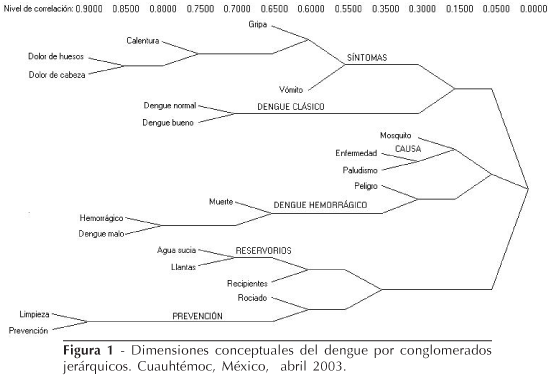OBJECTIVE: To explore the conceptual dimensions of dengue in the urban context, aiming at creating hypotheses about community attitudes toward prevention campaigns. METHODS: An exploratory cross-sectional study was carried out between March and April 2003 comprising 130 people selected by proposition sampling in three municipalities with different dengue prevalences in Mexico. Semi-structured interviews were applied using free lists, pile sorts and triads. Dengue-related terms and groups of conceptual dimensions were investigated. A consensual analysis was performed by factorizing the major components as well as a dimensional analysis with hierarchical clustering and multidimensional scales. RESULTS: The consensual model showed high homogeneity in dengue conceptions (values of 14.5 and 13.5 in the most prevalent contexts, and 5.4 in the least prevalent one). The common dimensions of conceptions were: preventive measures, symptoms, causes and reservoirs of Aedes aegypti (goodness of fit test values: <0.28). In the three contexts studied, a conception of basic prevention based on public actions by health officials predominated while individual and community actions were almost never mentioned. A moral dimension also appeared in the conception based on a notion of hygiene as a differentiating mechanism between the nearby community (clean) and outside people and communities (dirty and sick). CONCLUSIONS: The cultural conceptions of dengue do not favor self-managed community involvement in vertical prevention campaigns, and create obstacles to modifying community and individual prevention and control practices.
Dengue; Cultural factors; Health behavior; Interviews; Community involvement

 Cultural conceptions on dengue in urban contexts in Mexico
Cultural conceptions on dengue in urban contexts in Mexico


